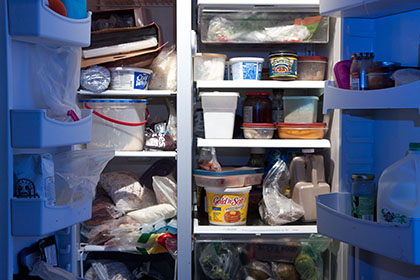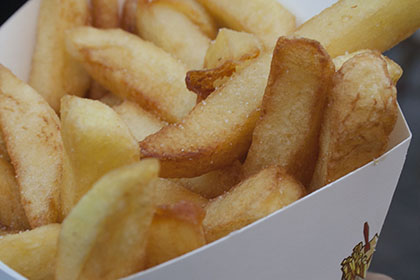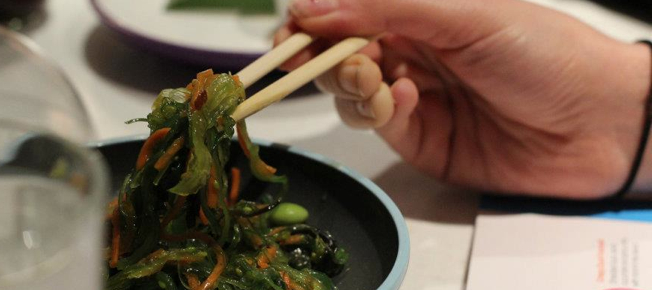Last month, I moved into my own studio apartment. Contrary to popular belief, the best part about living alone isn’t the ability to walk around pantsless or let dirty dishes pile up in the sink for a week. Actually, it’s that—for the first time in my life—I indulge in the privacy of my own fridge and freezer. Having spent significant time over the past six years sharing fridge space with roommates (some friends, some strangers), employers, coworkers, and other people who have flickered in and out of their lives—and therefore mine—I have come to learn that a glimpse into other people’s refrigerators reveals the most essential, and sometimes most intimate, facets of their lives.
We’re probably all familiar with the proverbial scene in a rom-com in which a girl snoops through her love interest’s medicine cabinet to uncover the skeletons in his closet. If I were getting ready to launch into a serious relationship, though, I’d look through his fridge and freezer to find out what he’s hiding.
Freezer full of chicken soup in Tupperware? His mom still delivers him prepared meals every week.
Dannon Light and Fit? There’s definitely another woman in the picture.
Based on an unofficial ethnographic study, conducted over a six-year period, across several neighborhoods across New York City, what this reporter has come to deem the “fridge-forage” has proven to be a surprisingly accurate litmus test for the habits and personalities of the test subjects. Names have been removed from the vignettes that follow in order to protect the identities of the people who failed their diet plans, served their children expired yogurt, and drank their roommates’ milk.
Chapter 1: City Parents
My first case study comes from when I was a freshman in college, babysitting for a couple with a newborn baby on the Upper East Side, and naïve enough to fall for the “help yourself to anything in the fridge” trap. As soon as the parents headed out, and the baby was fast asleep, I excitedly tiptoed into the kitchen, thinking I’d whip up a meal with the groceries I imagined working adults in New York kept on hand. Instead of the freshly baked hearth breads, heirloom vegetables, and mélange of dips I’d envisioned, I found moldy cheese (and not the good kind of mold), a jar of mustard three years past the expiration date, and a half-finished bottle of white wine. Conclusion: Despite being proud parents, this couple, a little older than the average first-time parents, were not ready to give up certain aspects of their New York routines from life before parenthood. Living in the one-bedroom apartment he’d owned since bachelorhood, and subsisting on a steady diet of takeout and leftovers were vestiges of their former life stage, anachronistic next to the baby food on the bottom shelf of the wine rack and Lipitor next to the takeout menus. “Transitioning Your Fridge: An Emotional Journey” is, apparently, lacking on the millions of “How to Prepare for Life with a Baby” blogs.
A second family, which I’ve tracked over the entire six-year period, lives in a large apartment on the Upper West Side with three kids under the age of five, and they keep Kosher, a set of Jewish dietary laws that I also observe. When I first met the family, I imagined their pantry would resemble the one in my house growing up. The first Saturday night I babysat for this family, the kids were finishing up their eggs, ketchup, grapes, and mashed peas, and the parents told me to “seriously help yourself to anything.” As had become my babysitting routine, when the kids headed to bed, I headed into the kitchen with an empty stomach and a head full of ideas about the bounty of treats I might find in a large household. In this case, sure that I’d find something that people over the age of 10 would find edible, and expecting lots of snacks, I peered into the fridge, only to land upon a grocery aisle’s worth of Gogurt, string cheese, bananas, ketchup, whole milk, Grape-Nuts, and Slim Fast shakes. There was one apple in the drawer. Conclusion: Busy parents who order Fresh Direct for Sunday delivery and have kids with nut and sesame allergies, do not have peanut butter and hummus on standby, end up eating like their kids most of the week, and have babysitters so they can eat out on Saturday nights. As they’ve moved past the pregnancy stage and into the world of Soul Cycling moms, these parents have exhibited a nod to health-conscious eating habits through the proverbial apple a day and cottage cheese. (Note that I have since opted to bring my own dinner for this babysitting gig.)
Chapter 2: The Roommate Experience
Observing life in someone else’s home is enlightening, but there may be no greater human experiment than the roommate experience in New York City, and from an ethnographic research perspective, living with the study subjects is the best way to gather evidence. Essentially, New York living boils down to people who consider each other to be friends—in the traditional sense, or, more likely, in the Facebook way—sharing the amount of space that people in the rest of the country call a closet. You quickly learn quirks and habits that you wish you didn’t know about the people you live with, and the fridge partition encapsulates that dynamic.
The apartment I shared with five roommates—not including my roommates’ boyfriends—made our fridge a Petri dish ripe with samples for my study. Each sixth of the fridge was an accurate reflection of the person who occupied the space. One roommate’s parents would drive into the city from Long Island every other Sunday with an SUV trunk full of Shop Rite brand yogurt. Conclusion: Parents from Long Island, having conducted a cost-benefit analysis of delivering groceries into the City on heavy traffic days, found that this arduous process relieves their children of the task of grocery shopping, allowing the students more time to study, and, as a result, earn better grades and ultimately higher-paying jobs.
A second roommate kept little in her section of the fridge. Instead, she would purchase a frozen burrito, microwavable Indian dish, or instant pad Thai every night, based on what she was craving. Conclusion: To become the highest achiever in the academic and extracurricular spheres requires allocating fewer brain cells to more mundane, organizational aspects of life, such as meal-planning and nutrition facts.
I would be remiss not to share a few of the high notes from my most recent post-college roommate situation, which jarringly brought to light the idiosyncrasies and extremes of each of our personalities, and ultimately the reasons I needed to find a room of my own. The fridge, never a clean three-way split, was constantly littered with remains of leafy greens, drips of coconut oil, and stains from dietary supplements, based on whichever made-for-TV diet one roommate was swearing by that week. She juiced everything in her NutriBullet and then separated the pulpy mush into small containers, which would topple out of the freezer every time I opened it. Curiously enough, all of her diets seemed to involve nightly consumption of an entire pint of chocolate ice cream, the traces of which would appear stuck to the counter every morning. Conclusion: All evidence pointed to an adult who was haphazard, scatterbrained, and searching for something life-changing—maybe weight loss—as she was single, approaching forty, and living with two twenty-something roommates who had to remind her to pay her bills on time.
Chapter 3: The Real World
Between roommates and siblings, friends and subletters, I entered the working world thinking that as green as I was in professional experience, I was seasoned at facing the interpersonal challenges of office life. At a company where the majority of my coworkers are under the age of thirty and don’t have children, I quickly appreciated the inspiration for episodes of The Office. My coworkers’ profiles were similar to mine in age, educational background, and social values. Within my first week of work, though, I was shocked by my observations of the way other people ate, and by what they thought of me because of my food choices. The single fridge, shared amongst 100 employees, was a steaming stank of half-eaten McDonald’s burgers, forgotten fountain sodas, moldy cheese from last Christmas’s potluck, expired Greek yogurts, half-finished juice cleanses, soggy tater tots, frozen mini tacos, a forgotten Tupperware, and beer. Conclusion: We are the typecast weight-watching, microwave “cooking,” starving by choice and by default, young urban professionals of NYC.
Even a surface-level fridgeology of my current, personal refrigerator would enable you to draw accurate conclusions about the person who inhabits this apartment. My fridge is neatly sectioned off by product type—produce, fruit, dairy, grains, and, for the most part, condiments—each of which is then ordered by expiration date. Vegetables are peeled, sliced, and placed in Tupperware on Sunday nights. Lunch is prepared before bed in Scandinavian BPA-free containers, placed on the shelf that I can reach with most efficiency on my way out the door each morning, and promptly shoved into the fridge upon arriving at work in order to secure prime real estate before the sticky leftover-bringers roll into the office. Conclusion: The first sweep of my fridge would reveal an Upper West Sider captivated by kale, quinoa, and Greek yogurt, somewhere on the spectrum of genuine and trendy health-conscious vegetarianism. A more detail-oriented look speaks to the measured and calculated way I approach decisions, which extends to how I choose what to eat. You’d see the struggle with balancing being on a budget and indulging in the Whole Foods groceries that are equally as expensive as they are nutritious , between regretting that I didn’t settle for takeout and feeling proud when I was determined to cook beans from scratch at 11 pm on a work night, and, ultimately, coming to terms with calling frozen yogurt and granola “dinner” two night in a row.
Reviewing this analysis, it’s not surprising that our refrigerators are gateways to our most genuine sense of self. It’s the fridge that knows first when we’re grazing like we’ve just gone through a break up, munching like we feel fat, snacking like we feel poor, or binging on our “skinny days.” We eat our feelings in the privacy of our own fridges, doors flung open, digging directly into that pint of ice cream, jar of salsa, or lame bag of salad we eat because we should. I don’t pretend to think my library-like fridge conveys more of a sense of “normal” than my coworker’s unassuming obsession with McDonald’s or those parents’ half-hearted ingestion of Slim Fast. What I have learned from this study is that, as people come in and out of your life, and jobs, relationships, and living situations are precarious, it’s important to have a strong sense of self, grounded in the way you keep your fridge. And, it’s probably best to keep it clean—after all, you never know who may be peeking inside.

Photo by Andy Sutterfield


